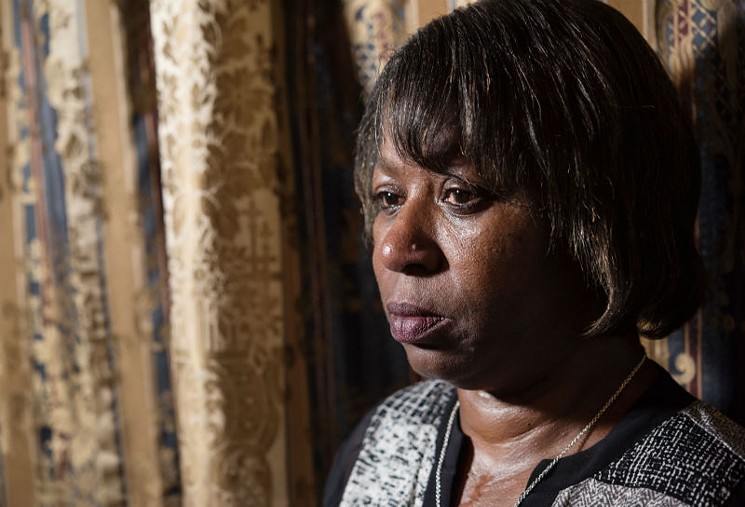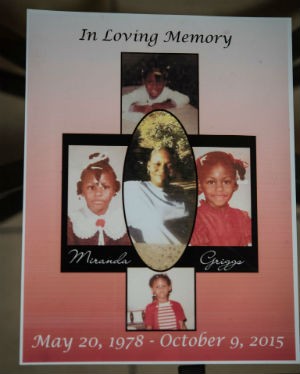
Joyce Griggs has been relentlessly pressing to find out what happened to her niece Marinda on the day she hanged herself in prison.
Photo by Sarah Miller
Instead, she was ordered to stay put, and when she resisted, was handcuffed, slammed to the ground and beaten, sending her to the hospital for four days. When she was released back to prison, she found out she was being disciplined for being a disruptive influence. After a hearing, 45 more days were tacked on to her sentence, 15 of them in solitary, a judgment that would do nothing good for her chances in 16 months when she would come up for parole consideration. She was eight years into a 20-year sentence for aggravated robbery.
Placed in solitary despite a history of suicide attempts, depression, schizophrenia and heavy-duty mental health medication, which was being withheld from her, Marinda Griggs died. On October 9, 2015, she was found hanging from a sheet in her cell at the Christina Melton Crain Unit in Gatesville. She was 37 years old, the oldest of six children.
She’d had plenty of practice at trying to check out before, as prison records show. Several times it involved a sheet, another time pills; sometimes threats. Whether these were considered and then rejected attempts or just inadequate to the task at hand isn’t known, but she finally mastered the mechanics of suicide and saw it through.
It was an abrupt end to a life that hadn’t been all that celebrated. Her mother, Patricia Griggs, was in and out of prison. From the time she was a few days old, Marinda was dependent on a grandfather and a step-grandmother living in Lubbock for her care. Texas Department of Criminal Justice records show that Marinda said she was raped by a stepfather when she was 15. Later that year, she moved in with her mother and then her aunt in Tyler, saying she wanted to be closer to her sisters and brother, but it could have been to get away from the stepfather. Which stepfather remains in question; there were several.
Marinda had epileptic seizures from the time she was 4 years old, a condition she complicated with a heavy application of illegal drugs in her late teens and 20s. In 2006, she called her mother crying from Dallas saying she wanted to come home; her boyfriend wanted her to work as a dancer in Dallas clubs and she didn’t want to, says Joyce Griggs, her 56-year-old aunt. Joyce lent Patricia her car, and Marinda returned to Joyce’s house in Tyler. There, another boyfriend beat her up. Joyce called the police on him, but Marinda dropped the charges although she got a black eye and broken ribs in the assault, Joyce says. Marinda told mental health services personnel at a Gatesville prison that she was raped at 28 by a “drug addict.”
Marinda landed in prison when she was 29 after she tried to hold up a convenience store with a butter knife while she was out of her mind on drugs. Her relatives say the people in the store just laughed at her. It even earned her a spot on the TV show World’s Dumbest Criminals, they say, shaking their heads.
A report filed at the time by Tyler’s KLTV said, “Officials say she chased the clerk with a knife throughout the store trying to get him to open the register.” A store camera recorded the entire episode, which showed Marinda trying unsuccessfully to pry the register open with the knife, then removing the register from the counter before giving up and grabbing two cartons of cigarettes. She tried to run out, but the store clerk and a UPS driver grabbed her while a customer blocked the front door with his vehicle so she couldn’t leave until police arrived.
In keeping with the rest of her life, she ended up in prison with a 20-year sentence for aggravated robbery despite having no previous felony convictions. She was the scary “other,” and her relatives still wonder — if she’d had blond hair and blue eyes, would she have been directed instead to the rehab she clearly needed?
Her family isn’t accepting the official ruling that Marinda’s death was all her own doing. Her aunt Joyce, with the help of Dallas law firm Sumner, Schick & Pace LLP, is suing the Texas Department of Criminal Justice and prison guard Sgt. James Casey Irby in a federal court in Houston under the Americans With Disabilities Act and the Texas Tort Claims Act for violation of Marinda’s rights. They are seeking unspecified compensatory, special and punitive damages and attorneys’ fees.
The lawsuit says the precipitating act that ended with Marinda’s death occurred days before, on September 29, 2015, when officers told her to get back in line and at least one of them “slammed Ms. Griggs on the concrete ground, and/or beat her so severely that she was caused to go to the hospital where she would remain for approximately four to six days.”
Their primary evidence is a letter that Marinda wrote to her boyfriend Kenny Green just hours before her death — a letter that was smuggled out of the prison and eventually passed on to Marinda’s family. In it, she details the attack on her, proclaims her innocence and names Irby as her main assailant.
Jeanine M. Coggeshall is the assistant state attorney general assigned to defend the state and Irby. When contacted, she declined any comment because of office policy, but her arguments are part of the state’s legal response filed in the case.
That response does not debate the finer points of what Marinda detailed in her letter, which her family believes was written 8-14 hours before she died. Instead, the state says that the lawsuit is in the wrong jurisdiction, that if anything, it belongs in state, not federal court. It says Joyce Griggs has no standing to bring this case.
Most important, it says that under the doctrine of sovereign immunity, which protects government agencies from lawsuits in many cases, neither the prison system nor any guards who might have been involved in injuring Marinda can be sued.
It is the ultimate get-out-of-jail-free card. For the jailers.
***
Sitting in the South Tyler living room of Joyce Griggs’ house, one she moved into to get away from the North Tyler neighborhood Marinda had known when she lived with her aunt, Marinda's sisters and their children fill the couches and chairs in the living room, ready to give their testimonies. Recollections are of the gentlest sort. Asked to describe Marinda, her aunt says, “She was like a real good kid. She always had the kindest heart.”
Marinda had four sisters and one brother but grew up with none of them, other than for short-lived, sporadic stays. Her mother, Patricia, lived with Marinda’s grandfather Robert Griggs and step-grandmother Annie Griggs in Lubbock. Joyce says Annie “took Marinda under her wing” just days after she was born. Annie would give Marinda small doses of Depakote, an anti-convulsant used to treat seizures, to try to keep things under control.
One sister recalls that Marinda collected dolls, did ballet and gymnastics, and had piano lessons. Her aunt says she liked volleyball and track. It’s unclear how much they knew her during her early years since she was living in another town with only occasional visits to fill in the blanks.
The epileptic seizures started early, about the time Marinda was 4, Joyce says. By age 15, she’d know when one was coming on, everyone agrees.
“She’d say, ‘I need to sit down.’ She lay on the floor. You can’t put no pillow on her head. It depends on what kind of seizure she was having. We would have to wait till she comes out of the seizure,” Joyce says.
“Sometimes she comes out of them, sometimes we would have to call 911.”
Patricia moved out of her parents’ house to an apartment when Marinda was 5, leaving behind her daughter. Joyce was living with Robert and Annie Griggs as well, but she moved to California in 1978 and didn’t return till ’81. In 1990, Joyce moved to Tyler. Four of Patricia’s children were raised in large part by Joyce, who had four children of her own.
“I raised my sister’s kids when my sister got in trouble with CPS,” she says. “That was instead of placing them in a home.”
Child Protective Services became involved after Patricia got caught stealing, Joyce says.
“When she got arrested, somebody called CPS on her, and she had to place her kids,” she says.
Joyce took everyone in except for one daughter who went to live with her father and Marinda, whom Annie insisted should continue living with her grandparents in Lubbock.
Eventually, when Marinda was 15, she moved to Tyler to try living with her mother again. This was not a good restarting point. She started falling by the wayside, Joyce says.
“Ninth grade, that was when she started acting up and skipping school,” she says. “She started thinking about boys.”
Marinda moved to Joyce’s house in 1995 or 1996 but dropped out of high school when she was 17, Joyce says, when she old enough to not need anyone's permission. She found a boyfriend and went to Dallas with him, Joyce says.
“Marinda didn’t get into drugs until she was 18 or 19,” Joyce says, and her use included cocaine. “She liked running around. And she would drink beer.”
The alcohol didn't mix well with all the prescribed medications Marinda was taking.
“Sometimes Marinda would not take her medicine just so she could drink,” Joyce says.
In 2002, Marinda was arrested for solicitation in Dallas and assessed a $500 fine and court costs, but other than that, she had no record until her aggravated robbery conviction.
After Marinda settled more or less into Joyce’s house in 2003, the grandparents who had been such a big part of Marinda’s life kept in touch with her by almost daily phone calls but didn’t visit her, Joyce says. Annie Griggs died in 2015.
Several of Marinda’s sisters say they are sad because Marinda never got to have children of her own, never was a mother. Her scattered and shattered life didn’t disqualify her from that privilege, they believe, although it’s hard to see how she could have taken care of someone else.
Asked what kind of jobs she held, they searched the air, trying to remember something before coming up with a stint at the Food Fast in Tyler. It didn’t last terribly long.
“She got fired for not coming in,” Joyce says.
It was the same convenience store that 28-year-old Marinda tried to rob a bit later. The one that got her two cartons of cigarettes, 15 minutes of fame on TV and the 20-year sentence.
***
Under the 11th Amendment, public institutions such as schools, cities and prisons are protected by sovereign immunity and cannot be sued except under certain circumstances, such as a specific statute outlining exceptions to that protection. Sovereign immunity is an understandable deterrent from errant lawsuits against public entities and servants in the performance of their duties.
But Steve Sumner, the lead attorney on the case (who is being assisted by attorneys Justin Sumner, his son, and Jamie R. Wilson) argues that by adopting the Texas Tort Claims Act, the state waived immunity in cases like this, and the government can be held liable. The attorney general’s office argues, in turn, that this waiver only applies to individuals, not a unit of government.
The plaintiff says the state is misreading the law.
“We have case law that rebuts that,” Wilson says. “For purposes of liability under the Texas Tort Claims Act, it doesn’t matter whether or not you’re a person. What matters is that your liability is of an individual person.”
The lawsuit expands on this.
“The Texas Tort Claims Act made it clear that units of government that previously enjoyed immunity from suit, shall now be liable for damages for death in certain prescribed citations if a private person would be so liable,” the lawsuit says.
In a case involving a prison inmate who alleged he was sexually abused in prison, which made similar claims of violation of his constitutional rights, U.S. District Judge Alfred H. Bennett of the Southern District of Texas — who also is hearing motions in the Griggs case — let that lawsuit go forward at the same motion-to-dismiss stage in the process, Wilson says.
The state says Joyce Griggs has no standing to ask for relief because she failed to present sufficient facts. The plaintiff says the state is keeping those facts from her by not releasing material and by fighting the plaintiff’s efforts to take depositions in the case. In fact, the state has filed a motion for a protective order that would “relieve them of the duty to respond to any requests for discovery” while the court decides whether to dismiss the case.
The state also says that since Joyce is not Marinda’s parent or heir or the legally appointed representative of Marinda’s estate, she has no standing. The plaintiff says Joyce has power of attorney from Marinda’s mother, Patricia (who is in prison for shoplifting), and that gives her standing.
As for the argument that this case is in the wrong court, the state argues that any waiver of sovereign immunity under the Texas tort law can only then be tried in state court, not in federal.
TDCJ also contests the plaintiff’s right to file a claim under the Americans With Disabilities Act, arguing that the plaintiffs cannot show Marinda’s rights were violated: “Plaintiff fails to show TDCJ intentionally discriminated against Marinda on the basis of her disability.”
The plaintiff says Marinda clearly can file under ADA since she had multiple disabilities, arguing that special provisions should have been made for her epilepsy and mental health issues. TDCJ, the plaintiff says, displayed indifference to Marinda’s medical needs and denied her a safe living environment when it placed her in that cell alone, knowing she was a suicide risk.
The state also argues that “Marinda’s death was caused by her suicide, not by Irby’s alleged actions. ... “Given the ten-day gap between the alleged conduct and the day of her suicide, it is only a tenuous connection between Irby’s alleged conduct and Marinda’s death.”
Irby’s actions, even “if taken as true, do not rise to the level of a constitutional violation,” the attorney general’s office says. And there is no proof that Irby knew his actions would lead to her suicide, the state insists.
***
On September 18, 2007, Marinda was incarcerated in the Lucille Plane State Jail, a women’s facility in Dayton in Liberty County. In a short time, she was moved to Gatesville. Then 29 years old, she was put through a battery of medical and diagnostic screenings that, according to the lawsuit, showed “a medical history of seizures, mental illness, and borderline intellectual functioning. She had also previously received mental health treatment at the Smith County Jail.”
Initially, there were no special restrictions on housing or work assignments for Marinda, but one month in, “her classification was changed to require consultation of a representative of the mental health department before taking disciplinary action against her,” according to the lawsuit.
Marinda, it seems, had a very difficult time adjusting to life in prison and clashed with guards repeatedly, relatives say, with resultant restrictions on her privileges. TDCJ classified her as “borderline intellectual functioning.” The prison system was also well aware of her epilepsy, the lawsuit argues.
“Prior to September 29, 2015, at least 95 occurrences of seizure activity were noted in Marinda Griggs’ medical records. Her seizures resulted in at least three hospitalizations during her incarceration,” it says.
The prison system also had ample evidence that Marinda was prone to suicidal thoughts, according to the lawsuit. TDCJ records show a continuing pattern of suicidal thoughts and actions on her part beginning on June 18, 2008, when she was admitted to crisis management “after threatening to commit suicide by cutting her wrists or gouging out her eyes.”
In February 2009, Marinda reported she was seeing dead people and feeling animals crawl across her body. She complained of visions of her mother in a bloodied state.
On May 16, 2009, she was hospitalized after she tried to hang herself.
“She wrapped a sheet around her neck and tied it off to cell bars,” according to TDCJ records. She spent more than two months after that in the Skyview Unit dedicated to inmates with psychiatric issues.
TDCJ records show Marinda tried to hang herself again on Aug. 19, 2009. She continued to “struggle with depression, auditory and visual hallucinations and thoughts of self-harm throughout 2010, 2011 and 2012,” the lawsuit says. And in September 2012, she tried to hang herself again.
In July 2013, she attempted to overdose on her medication. That December, she made a noose and threatened to hang herself, and in January 2014, she was found with a torn bed sheet around her neck tied off to the bar of a bunk bed. Ordered to remove it, she did.
All this time, Marinda was bouncing back and forth from crisis management and collecting new diagnoses from the prison system, including posttraumatic stress disorder, schizoaffective disorder, psychotic disorder, antisocial personality disorder and major depressive disorder with severe psychotic features. Her list of medications during her prison stay included Prozac, Celexa, Thorazine, Trilafon, Risperdal, Navane, Klonopin, Seroquel and Zoloft in addition to the Depakote.
Despite all these assessments and medications, her mental health classifications were changed in February 2013, and the prison system “no longer required consultation of a mental health representative before taking disciplinary action against her.”
In January 2015, Marinda again tied a sheet around her neck, and weeks later, “she reported hearing voices that told her to kill herself and was found in possession of a razor blade,” according to prison records. In March 2015, she asked to be put back on her prescribed mental health medication, but TDCJ refused, saying that she was suspected of hoarding pills. According to attorney Wilson, prison records show TDCJ had stopped giving her mental health medication back in September 2013 and never reinstated it.
This is a strong point of contention for the plaintiff’s attorneys.
“They state that they lifted her psychiatric meds because they said she was hoarding them, but yet they continued to give her her epilepsy meds, and she could have overdosed on either one of those. That doesn’t make any sense.” Justin Sumner says.
“They state that they lifted her psychiatric meds because they said she was hoarding them, but yet they continued to give her her epilepsy meds, and she could have overdosed on either one of those."
tweet this
By September of that year, Marinda was well known to the prison personnel. She had filed grievances against guards and the prison’s medical personnel, saying they were ignoring her complaints. She was working in the kitchen although she was supposed to avoid heat, which could trigger a seizure. According to TDCJ records, she suffered seizures in her sleep and then would miss the morning pill line where she would have received her medication. This, in turn, increased the number of her seizures.
The planets aligned in a very bad way for Marinda Griggs on September 29, 2015. She wanted to go to the infirmary, but the guards were trying to get their inmate count in on time and said no. Tempers and actions escalated from there, and she ended up badly hurt.
Upon her return to the prison unit on October 2, “she was immediately placed in a single cell/solitary with access to air vents’/ducts, prison bars, non-breakaway bed sheets, and other dangerous tie-off points,” the lawsuit says. She remained there until her disciplinary hearing on October 8. She had no legal representation, and she was not provided a copy of the write-up against her. Marinda received a sentence of 15 days in solitary confinement. For the rest of her 45-day sentence, there would be no recreation and no visits to the commissary, and she’d be restricted to her cell. She, in turn, filed a grievance against Irby, which went nowhere.
The law firm Sumner, Schick & Pace is still trying to determine through a slowly unfolding discovery process which other officers may have joined Irby in using physical force against Marinda. Two other officers were disciplined in the matter for violating procedures, the lawyers say, one for allowing the camera to turn off while Marinda was receiving medical care and the other for yelling, “Sit your ass down,” on what video there was. But so far, they say, they have not found any evidence that Irby was disciplined for his actions — mostly because the state has been declining to hand over any information.
Marinda’s autopsy report shows that besides the ligature marks left by her strangulation, her sternum was broken, but that may have been caused by chest compression when responders tried to revive her. She had multiple abrasions on her left wrist, which Justin Sumner believes were caused by handcuffs. Her left temple was scabbed over and still healing. According to Marinda’s letter, Irby had injured her head.
Throughout her time in prison, Marinda’s family had communicated with her by mail, through phone calls and through the prison grapevine. No one from the family ever visited Marinda. Joyce says they didn’t have a car to travel to Gatesville.
One of the other ways they stayed in touch was through an intermediary. Joyce would talk with the warden and the prison chaplain to get word of how Marinda was doing, but she came to believe their words weren't always 100 percent accurate.
On September 29, Joyce got a call from her brother, who’d heard from another inmate that Marinda had been body-slammed by a guard and taken to the hospital. She immediately called the prison, asking to talk to the warden and the chaplain. She says the chaplain said he was going to have Marinda call her. Joyce called right back and talked to the warden.
“The warden that day said Marinda was OK and there was nothing wrong,” she says. “They wouldn’t tell me she was taken to the hospital, but I knew she was in the hospital because of the phone call.
“I called back that next morning. Kept calling every two to three hours. I called back the chaplain on the third day. That was on a Monday. He told me he’d seen Marinda that Friday and he’d have her call me. That didn’t happen. He said he’s seen her on Friday and she looked OK. That was a lie.”
On October 9, the chaplain called Joyce at about 1:30 p.m. to tell her Marinda was dead. Joyce says he apologized and admitted he had not seen Marinda earlier when he said she was all right.
Not at all convinced initially that Marinda had died by her own hand, Joyce made calls and tried to find out more about what happened. The day of the funeral, she contacted Justin Sumner, who took down her story. Once she had a copy of Marinda’s letter to her boyfriend in her hand, the case moved into high gear.

Joyce Griggs meeting with attorney Justin Sumner at her home in Tyler earlier this year.
Photo by Margaret Downing
***
Marinda Griggs was a troubled, ill woman and a troublesome inmate. She suffered frequent seizures, had depression and made repeated trips to the prison clinic complaining of hallucinations. She was suicidal. But she wasn't helpless, and she filed multiple grievances against her guards and prison medical staff.
Then one day, those same prison officials who had denied her mental health medicine, placed her alone in a cell along with all the tools she needed to end her own life. Her death should have surprised no one.
In Marinda’s last letter, she told Green that she was rushed to the hospital.
“Wuz put in intensive care for a whole day in [sic] a half.”
She said she felt a seizure coming on and named Irby.
“He putz me in handcuffz cuz I’m cryin cuz my chest is hurtin & I’m also feelin a seizure comin,” she wrote. “So I started twitchin & movin & shakin cuz I felt my seizure. He slam me hard on the ground & I went straight into a seizure. I waz at the hsopital for 4 dyz. They had to do brain work and everything. The Srgt. mezzed up the side of my head.”
Her letter goes on to say how she wanted to come home, how she wanted her life back but knew that she’d have to wait even longer for a parole hearing now. She carefully included what Irby wrote about her actions, which says that she failed to obey him and calm down. She begged Green to take her case to another warden and protest the injustice of it all.
At the end, she wrote about how she accepted God in her life on Aug. 31, 2014, and says, “I gave my all & my whole zelf to God on October 5, 2015. I serve no one but God.” She signed her letter, “In Jesuz name. Amen.”
Marinda’s aunt doesn’t know how the letter reached her.
“We don’t know how the letter got out because she was in solitary confinement,” Joyce says. Other inmates couldn’t have gotten to her, she says, so she thinks it had to be someone who worked at the prison.
“We believe an officer got the letter and put it in his shirt and mailed the letter out,” she says. “There was a guardian angel who didn’t approve of what was going on with Marinda that sent the letter out.”
Joyce thinks Marinda would have had a better chance in life if she’d been under Joyce’s care from the start. Joyce points to her own four children and all the relatives’ children she’s raised through the years. None of the children she had did without, she says.
“They never went without no food. They never went without no house. They never went without no clothes. They never got no water, lights and gas cut off,” she says.
Justin Sumner, who still hasn’t gotten the prison’s protocols and manuals, says he doesn’t believe the guards followed correct procedure in Marinda’s case.
“Even if they believe someone is trying to hoard medication, you can’t stop giving somebody mental health medication entirely. That’s torture is what that is,” he says.
He and his firm believe something is wrong with how the Gatesville prison handles suicidal inmates. They filed an open records request to see how often suicides have been recorded at the Gatesville prison and found that from 2005 to May 2015, there were 16 instances of suicide, usually by hanging.
“I believe what my clients would say is that mental health in prison is a big issue,” Justin Sumner says. “In this instance, not only did she have serious mental health issues that included depression, she was being treated for a long period of time. She was also schizophrenic. She had visions. So when somebody is suffering in prison like that, alone, serving their time, they can’t be deprived of medication.
“You cannot play God and pick and choose which medications you’re going to give her or whether or not you’re OK with her being tortured, afraid and scared to death in prison,” he says. “They decide to stop giving her her medication, which any reasonable person would know would exacerbate her condition. And then to put her in a detention cell by herself with bed sheets, access to pipes which she could hang herself with that bed sheet, it’s just outrageous to me.
“The whole purpose of this is to deter future conduct, and I think it goes far beyond negligent conduct of the defendant in this instance. This was knowing conduct. They had every opportunity to do the right thing here, and they didn’t.”









